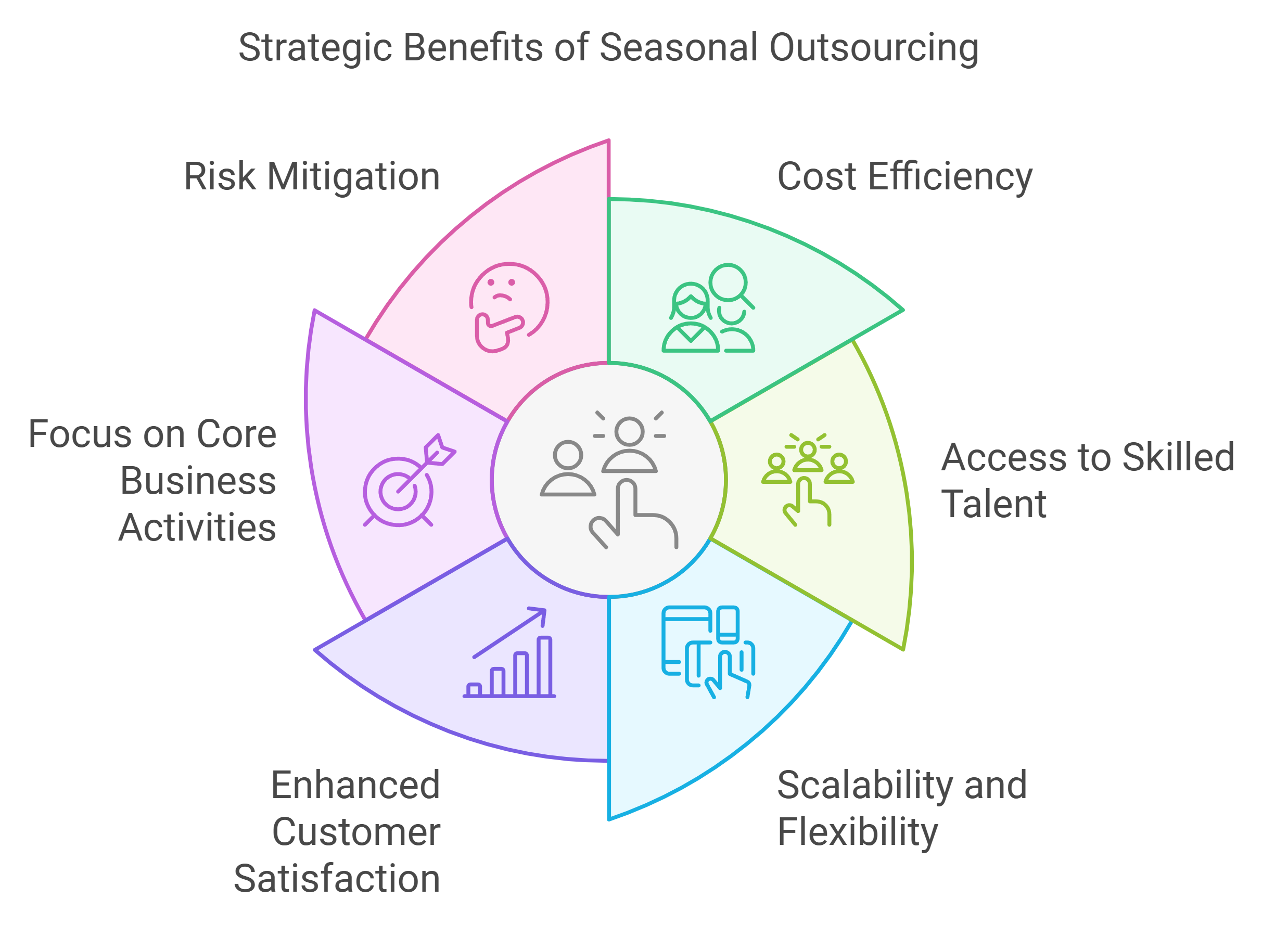Maximizing Efficiency During Peak Times: The Advantages of Seasonal Outsourcing
In the dynamic world of business, seasonal fluctuations are a common challenge across various industries. From retail surges during the holidays to increased demand in the tourism sector during vacation seasons, businesses often grapple with managing these peaks efficiently. Staffing for these periods can be tricky—overstaffing leads to unnecessary costs during off-peak times, while understaffing can result in lost sales and dissatisfied customers. Seasonal outsourcing emerges as a strategic solution to navigate these challenges effectively. This article delves into the advantages of seasonal outsourcing and how it can help businesses optimize operations during peak periods.

Introduction
Understanding Seasonal Fluctuations in Business
Seasonal fluctuations refer to predictable changes in business activity that occur at specific times of the year. These can be driven by:
- Holidays and Festive Seasons: Increased consumer spending during holidays like Christmas, Black Friday, and Valentine's Day.
- Weather Changes: Demand shifts in industries like agriculture, fashion, and tourism due to seasonal weather patterns.
- Fiscal Year-End Activities: Financial services and accounting firms often experience spikes due to tax seasons or fiscal year closings.
- Academic Calendars: Education-related businesses may see fluctuations aligned with school terms and semesters.
The Challenges of Managing Seasonal Demand
Key challenges businesses face include:
- Staffing Dilemmas: Hiring full-time staff for short-term needs leads to higher labor costs and potential layoffs post-season.
- Training Time Constraints: Limited time to train temporary in-house staff adequately.
- Resource Allocation: Difficulty in scaling operations up or down quickly without affecting service quality.
- Cost Management: Balancing the costs associated with recruitment, training, and compensation for short-term staff.

What is Seasonal Outsourcing?
Seasonal outsourcing involves partnering with external service providers to handle increased workloads during peak periods. This strategy allows businesses to:
- Access Temporary Expertise: Bring in skilled professionals on a short-term basis.
- Maintain Flexibility: Adjust the level of support as demand fluctuates.
- Focus on Core Activities: Let external partners handle operational tasks while the business concentrates on strategic initiatives.

Advantages of Seasonal Outsourcing
1. Cost Efficiency
Reduced Labor Costs
- Eliminate Recruitment Expenses: Avoid costs related to advertising job openings, interviewing, and onboarding.
- Save on Benefits and Overhead: Outsourced staff are typically not entitled to benefits like health insurance or retirement contributions, reducing overall expenses.
- Flexible Pricing Models: Pay only for the services utilized during the peak period.
Example: A retail company outsourcing customer service during the holiday season can save significantly compared to hiring temporary in-house staff, considering wages, training, and administrative costs.
2. Access to Skilled Talent
Immediate Availability of Trained Professionals
- Expertise on Demand: Outsourcing providers have a pool of skilled workers ready to deploy.
- Minimal Training Required: Outsourced staff are often already trained in industry best practices and technologies.
- Specialized Skills: Access to professionals with specific expertise that may not be available internally.
Example: An e-commerce platform can quickly onboard experienced customer support agents during sales events without the lag time associated with training new hires.
3. Scalability and Flexibility
Adjusting Resources Based on Demand
- Seamless Scaling: Increase or decrease support levels in response to real-time demand.
- No Long-Term Commitments: Engage services only when needed without obligations beyond the peak period.
- Customized Solutions: Tailor the scope of services to match specific seasonal requirements.
Example: A tax preparation firm can scale up its team of accountants during tax season and scale down afterward without the complications of hiring and laying off staff.
4. Enhanced Customer Satisfaction
Maintaining Service Quality During Peaks
- Reduced Wait Times: Additional support prevents bottlenecks in customer service or order processing.
- Consistent Service Levels: Ensure that increased demand doesn't compromise the quality of customer interactions.
- 24/7 Support Options: Outsourcing partners can provide around-the-clock service to accommodate different time zones and customer needs.
Example: A travel agency can offer uninterrupted booking and support services during vacation seasons, enhancing the customer experience.
5. Focus on Core Business Activities
Allowing Internal Teams to Concentrate on Strategic Tasks
- Operational Efficiency: External partners handle routine tasks, freeing up internal resources.
- Innovation and Growth: Internal teams can focus on developing new products, marketing strategies, or business expansions.
- Stress Reduction: Alleviate the pressure on permanent staff during high-demand periods.
Example: A manufacturing company outsources its customer service during peak sales periods, allowing its internal team to focus on production efficiency and meeting delivery deadlines.
6. Risk Mitigation
Navigating Uncertain Demand
- Avoid Overstaffing: Reduce the financial risk associated with hiring more permanent staff than necessary.
- Compliance and Liability: Outsourcing partners manage HR compliance for their staff, reducing legal responsibilities for the business.
- Performance Guarantees: Service level agreements (SLAs) ensure that the outsourcing partner meets specified performance metrics.
Example: A fashion retailer can mitigate the risk of fluctuating demand by outsourcing its order fulfillment during seasonal sales, avoiding potential losses from unsold inventory or idle staff.
Implementing Seasonal Outsourcing Successfully
1. Selecting the Right Outsourcing Partner
- Experience and Expertise: Choose providers with a proven track record in your industry.
- Scalability: Ensure they can handle the required volume and adjust as needed.
- Cultural Fit: Partner with companies that understand your brand values and customer service standards.
- Communication: Clear and consistent communication channels are essential for coordination.
2. Defining Clear Objectives and Expectations
- Detailed Contracts: Outline the scope of work, timelines, performance metrics, and responsibilities.
- Training and Onboarding: Provide necessary training materials and brand guidelines to the outsourcing team.
- Regular Monitoring: Implement systems to track performance and address issues promptly.
3. Maintaining Data Security and Compliance
- Data Protection Measures: Ensure the provider adheres to data security protocols and compliance regulations.
- Confidentiality Agreements: Protect sensitive information through legally binding agreements.
- Access Controls: Limit access to data on a need-to-know basis.
Case Study: Retailer Maximizing Holiday Sales Through Seasonal Outsourcing
Background:
A mid-sized online retailer experiences a 200% increase in sales during the holiday season. In previous years, they struggled with customer service bottlenecks, delayed responses, and decreased customer satisfaction.
Solution:
The retailer decided to outsource customer support during the peak season.
Results:
- Improved Customer Satisfaction: Response times decreased by 50%, and positive customer feedback increased.
- Increased Sales: Efficient handling of inquiries and issues led to higher conversion rates.
- Cost Savings: Reduced expenses compared to hiring and training temporary in-house staff.
- Operational Efficiency: Internal teams focused on inventory management and marketing strategies.
Conclusion
Seasonal outsourcing offers a strategic advantage for businesses facing fluctuating demand periods. By leveraging external expertise, companies can enhance efficiency, control costs, and deliver superior customer experiences without the long-term commitments and risks associated with traditional staffing methods.
Harness the Power of Seasonal Outsourcing with Bridge Business Support Services
At Bridge Business Support Services, we specialize in providing flexible and scalable outsourcing solutions tailored to your seasonal needs. Our team of skilled professionals is ready to support your business during peak times, ensuring you capitalize on opportunities without compromising on quality.
Ready to Optimize Your Operations This Season? Contact us today to explore how our seasonal outsourcing services can help you navigate demand fluctuations smoothly and drive your business success all year round.